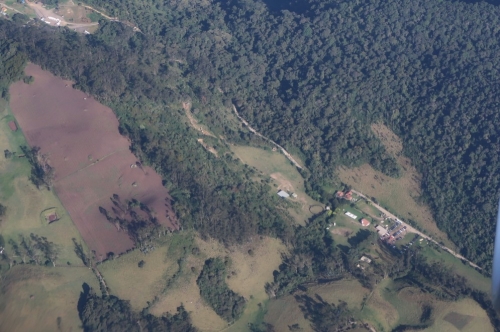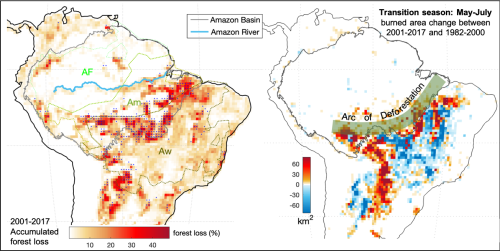Climate change, loss of forests and fires – Vicious circle in the Amazonian forests
Climate change, loss of forests and fires – Vicious circle in the Amazonian forests
Amazonia experiences seasonal fires in each year. More than 90% of the fires are distributed across the southern boundary of Amazon Basin where the vegetation dominated by savannas are flammable in the dry season. In recent decades, however, more fires have been reported in the Amazonian forests. The 2019 Amazon fires surged in a record high.
A new study, published in Global Change Biology, showed how the fire expansion is attributed to climate regime shift and forest loss. The study was led by scientists from Institute of Atmospheric Physics at Chinese Academy of Sciences.
“I have not been to the Amazon forest but I took a photo of it from my window seat when I was in a plane flying over the Amazon in 2018 fire season. It pained me to think such intense greenness and freshness might have been scorched.” said Prof. JIA Gensuo, one of the authors of the study.

Landscape mosaic of tropical forest, cropland and traces of burning in eastern side of Andes front range (Image by JIA Gensuo)
Global climate change and local deforestation have been blamed as main drivers behind fire intensification. “However, mechanisms and interactive effects are largely ignored and not understood.” said JIA.
According to this study, the Amazon fire regime has been expanding from the flammable savannas to moist tropical forests and the fire season is initialized much earlier than two decades ago.

Accumulated forest loss during 2001-2017 and fire regime change during the transition season (May-July) (Image by XU Xiyan)
“The fire expansion is a result of more extreme climate events which made the forest more vulnerable, and intensive forest loss which warmed and dried the lower atmosphere, therefore increased fire susceptibility,” said Dr. XU Xiyan, the first author of the study, “fire exacerbates forest loss and results in a vicious cycle.”
Fire burning data derived from satellites observation indicated more fires occurring along the “Arc of Deforestation”, a curve at the southeastern edge of the forest where deforestation is most rapid. In the study, they used multiple satellite data products and climate reanalysis to ensure consistency and reliability.
The Amazon forests is getting dryer and more fire susceptible due to coupled changes of climate seasonality, forest loss, and wildfire. Such positive feedback greatly undermines the sustainability of Amazon region.
“Climate change mitigation and sustainable land management are key to avoid or at least postpone the ‘tipping point’ of the Amazon forest.” said XU. The “tipping point” is a threshold when the forest loss causes an abrupt or irreversible change in parts of the Earth system.
###
This study was supported by the Natural Science Foundation and National Key R&D Program of China, Strategic Priority Research Program of the Chinese Academy of Sciences, and U.S. Department of Energy, Office of Science, Biological and Environmental Research, Regional and Global Climate Modeling program through the RUBISCO Scientific Focus Area.
Reference:
Xiyan Xu, Gensuo Jia, Xiaoyan Zhang, William Riley, Ying Xue. 2020: Climate regime shift and forest loss amplify fire in Amazonian forests. Global Change Biology, doi: 10.1111/gcb.15279. https://onlinelibrary.wiley.com/doi/abs/10.1111/gcb.15279
From Institute of Atmospheric Physics, Chinese Academy of Sciences, in EcoDebate, ISSN 2446-9394, 27/07/2020
Para pesquisar mais sobre este tema ou outros, use a ferramenta de pesquisa
[CC BY-NC-SA 3.0][ O conteúdo da EcoDebate pode ser copiado, reproduzido e/ou distribuído, desde que seja dado crédito ao autor, à EcoDebate com link e, se for o caso, à fonte primária da informação ]
Inclusão na lista de distribuição do Boletim Diário da revista eletrônica EcoDebate, ISSN 2446-9394,
Caso queira ser incluído(a) na lista de distribuição de nosso boletim diário, basta enviar um email para newsletter_ecodebate+subscribe@googlegroups.com . O seu e-mail será incluído e você receberá uma mensagem solicitando que confirme a inscrição.
O EcoDebate não pratica SPAM e a exigência de confirmação do e-mail de origem visa evitar que seu e-mail seja incluído indevidamente por terceiros.
Remoção da lista de distribuição do Boletim Diário da revista eletrônica EcoDebate
Para cancelar a sua inscrição neste grupo, envie um e-mail para newsletter_ecodebate+unsubscribe@googlegroups.com ou ecodebate@ecodebate.com.br. O seu e-mail será removido e você receberá uma mensagem confirmando a remoção. Observe que a remoção é automática mas não é instantânea.